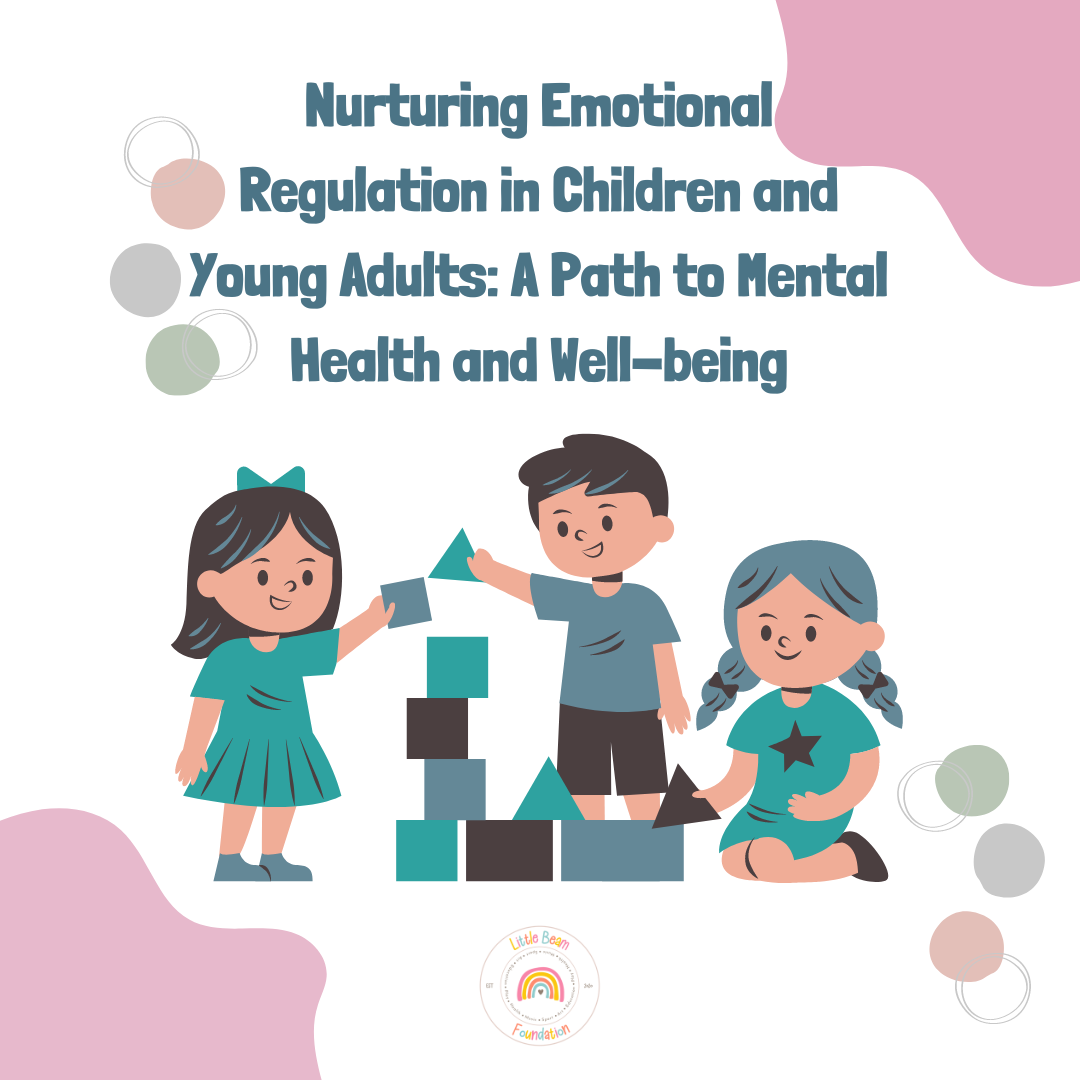Nurturing Emotional Regulation in Children and Young Adults: A Path to Mental Health and Well-being

Emotional regulation is a vital skill that allows individuals to manage and respond to their emotions effectively. For children and young adults, navigating the complexities of emotions can be challenging, but learning to regulate emotions is essential for promoting mental health and well-being. As advocates for children and young adult mental health and well-being, it's crucial to provide them with the tools and strategies to develop emotional regulation skills. In this blog, we will explore the importance of emotional regulation for children and young adults and provide evidence-based strategies to support their emotional development.
Understanding Emotional Regulation: Emotional regulation refers to the ability to recognise, understand, and manage one's emotions in a healthy and adaptive manner (Gross, 2015). It involves processes such as identifying emotions, evaluating their intensity and significance, and implementing appropriate strategies to modulate emotional responses. Effective emotional regulation enables individuals to cope with stress, navigate interpersonal relationships, and make thoughtful decisions.
The Importance of Emotional Regulation:Emotional regulation plays a crucial role in children and young adults' mental health and well-being in several ways:
- Self-awareness: Emotional regulation promotes self-awareness by helping individuals recognise and label their emotions accurately (Brackett et al., 2012). When children and young adults can identify and understand their feelings, they are better equipped to communicate their needs and seek support from others.
- Coping with Stress: Effective emotional regulation skills enable children and young adults to cope with stressors and adversity more effectively (Aldao et al., 2010). By regulating their emotions, individuals can reduce the impact of stress on their mental and physical health and maintain a sense of balance and resilience.
- Building Relationships: Emotional regulation is essential for forming and maintaining positive relationships with others (Eisenberg et al., 2010). When individuals can regulate their emotions, they are better able to express empathy, communicate effectively, and resolve conflicts constructively, fostering healthy interpersonal connections.
- Decision-making: Emotional regulation influences decision-making processes by allowing individuals to consider their emotions and evaluate their implications (Gross, 2015). When children and young adults can regulate their emotions, they are more likely to make reasoned and intentional choices that align with their values and goals.
Strategies for Promoting Emotional Regulation: Empowering children and young adults to develop emotional regulation skills requires intentional efforts and supportive environments. Here are some evidence-based strategies to promote emotional regulation:
- Emotion Identification :Encourage children and young adults to identify and label their emotions accurately using words that describe their feelings (Rieffe et al., 2011). Provide them with opportunities to practice recognising emotions in themselves and others through activities such as storytelling, role-playing, and emotion-focused games.
- Mindfulness and Relaxation: Teach children and young adults mindfulness and relaxation techniques to help them regulate their emotions and reduce stress (Bennett et al., 2019). Activities such as deep breathing exercises, guided imagery, and progressive muscle relaxation can promote calmness and emotional stability.
- Cognitive Restructuring: Help children and young adults challenge and reframe negative thoughts and beliefs that contribute to emotional dysregulation (Beck, 2011). Teach them to identify cognitive distortions such as catastrophizing or black-and-white thinking and replace them with more balanced and adaptive perspectives.
- Social Support: Encourage children and young adults to seek support from trusted friends, family members, or mental health professionals when they are struggling to regulate their emotions (Gross, 2015). Foster a supportive and empathetic environment where individuals feel safe expressing their feelings and receiving validation and understanding.
- Healthy Lifestyle Habits: Promote healthy lifestyle habits such as regular exercise, balanced nutrition, adequate sleep, and hydration, which contribute to overall emotional well-being (Fletcher et al., 2012). Engaging in physical activity releases endorphins, neurotransmitters that promote feelings of happiness and reduce stress.
Nurturing emotional regulation skills is essential for promoting children and young adults' mental health and well-being. By equipping them with strategies to recognise, understand, and manage their emotions effectively, we can empower them to cope with stress, build positive relationships, and make thoughtful decisions. Through intentional efforts to promote emotion identification, mindfulness and relaxation, cognitive restructuring, social support, and healthy lifestyle habits, we can foster emotional resilience and empower children and young adults to thrive in all aspects of their lives.
References:
- Gross, J. J. (2015). Emotion regulation: Current status and future prospects. Psychological Inquiry, 26(1), 1–26.
- Brackett, M. A., Rivers, S. E., Shiffman, S., Lerner, N., & Salovey, P. (2012). Relating emotional abilities to social functioning: A comparison of self-report and performance measures of emotional intelligence. Journal of Personality and Social Psychology, 101(4), 881–898.
- Aldao, A., Nolen-Hoeksema, S., & Schweizer, S. (2010). Emotion-regulation strategies across psychopathology: A meta-analytic review. Clinical Psychology Review, 30(2), 217–237.
- Eisenberg, N., Cumberland, A., & Spinrad, T. L. (2010). Parental socialization of emotion. Psychological Inquiry, 15(3), 177–182.
- Rieffe, C., Oosterveld, P., Miers, A. C., Terwogt, M. M., & Ly, V. (2011). Emotion awareness and internalising symptoms in children and adolescents: The Emotion Awareness Questionnaire revised. Personality and Individual Differences, 50(5), 935–940.
- Bennett, S., Shah, A., Vicendese, D., Glozier, N., Grunstein, R., & Zwar, N. (2019). Behavioural interventions for sleep problems in adults aged 60+. Cochrane Database of Systematic Reviews, 1(1), CD012552.
- Beck, J. S. (2011). Cognitive behavior therapy: Basics and beyond. Guilford Press.
- Fletcher, L., Hayes, S. C., & Hayes, S. C. (2012). Relational frame theory, acceptance and commitment therapy, and a functional analytic definition of mindfulness. Journal of Rational-Emotive & Cognitive-Behavior Therapy, 30(2), 88–107.


